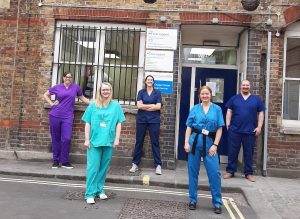
By Samantha Dorney-Smith, Nursing Fellow, Pathway
My usual role is Nursing Fellow for Pathway, and the Homeless Health Programme Lead for the Queen’s Nursing Institute. I have also been working one evening a week since January 2020 for Doctors of the World undertaking medical outreach in the City of London.
On Saturday 20th March 2020 I arrived to volunteer at the MHCLG funded Limehouse Holiday Inn alongside volunteer GP Sophie Mylan. I had been asked that week by the Find and Treat Clinical Lead Dr Al Story to find volunteers through the LNNM network to help the COVID19 effort, and thought I should volunteer to be one of the first on scene.
The ‘Everyone In’ programme of hotels had only been finally agreed that week, and Limehouse was the first of these hotels to start taking clients from night shelters, the No Second Night Out projects and Heathrow airport. The day before, I had been sitting with Find and Treat and we had been assured everyone had been triaged to assess medical vulnerability, and to find out if they had symptoms – so I was initially volunteering to check in and see if any support was needed.
When I arrived, of the 37 clients already at the hotel, staff identified to us immediately three clients that they thought were medically vulnerable. After our clinical assessment, those three clients were medically vulnerable, and two had COVID19 symptoms.
We then started a pretty intensive period of triage and urgent support provided by multiple volunteers and self-redeployed staff to help get ‘Everyone In’ safely, and cohort them effectively.
I stayed supporting this 150-bed hotel and another 200-bed hotel, City Travelodge for 6 weeks. During that time we managed around 25 symptomatic clients, mostly on the floor we designated for symptomatic clients at Limehouse.
I had to source all our resources – staff, clinical equipment, PPE, locked cabinets etc over the initial few days, and develop messaging and procedures in the hotels to make them safe from a public health point of view.
All clients received a medical triage, and clients needing help with addiction and their mental health were plugged into emergency support to stabilise them and help them settle and self-isolate. The response was effective, and I believe, saved many lives; particularly if we look in comparison at other cities e.g. some cities in the United States of America.
Throughout this time I also provided telephone triage support to more remote outreach workers as part of a team, and also continued my own outreach in the City of London on Tuesday evenings, helping to bring people in.
Since this initial six weeks of emergency hotel outreach, I have moved for a few weeks to continue to support medical triage in the hotels in North West London.
Looking to the future, I am now discussing being part of a virtual Pathway team to support ‘move on’ from the hotels. Throughout this time I have also been supporting the Healthy London Partnerships Homeless Health COVID19 control in producing guidance to support the care of all the 4000 clients across London. Additionally, I have supported inclusion health nurses and Health Visitors around the country via the QNI by providing information, resources and networking platforms.
It’s been a busy time to say the least…but I have loved being back on the frontline. And I have loved being part of a system where it is possible to say yes.
Yes, we have accommodation. Yes, we can get you rapidly scripted. Yes, we can get you mental health support even though you have an addiction. Yes, to food, new clothes, a SMART phone, a TV in your room. Yes, to simple things like Language Line when you need it (although admittedly accessing services like GPs have been difficult so it hasn’t all been perfect). Yes, to sharing information sensibly to benefit people’s health.
I really, really hope the system learns from this unprecedented time, and doesn’t go back. But either way, it’s good to know we saved lives when it was needed.